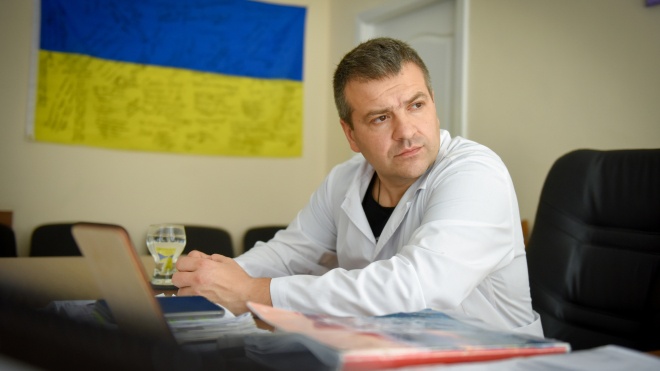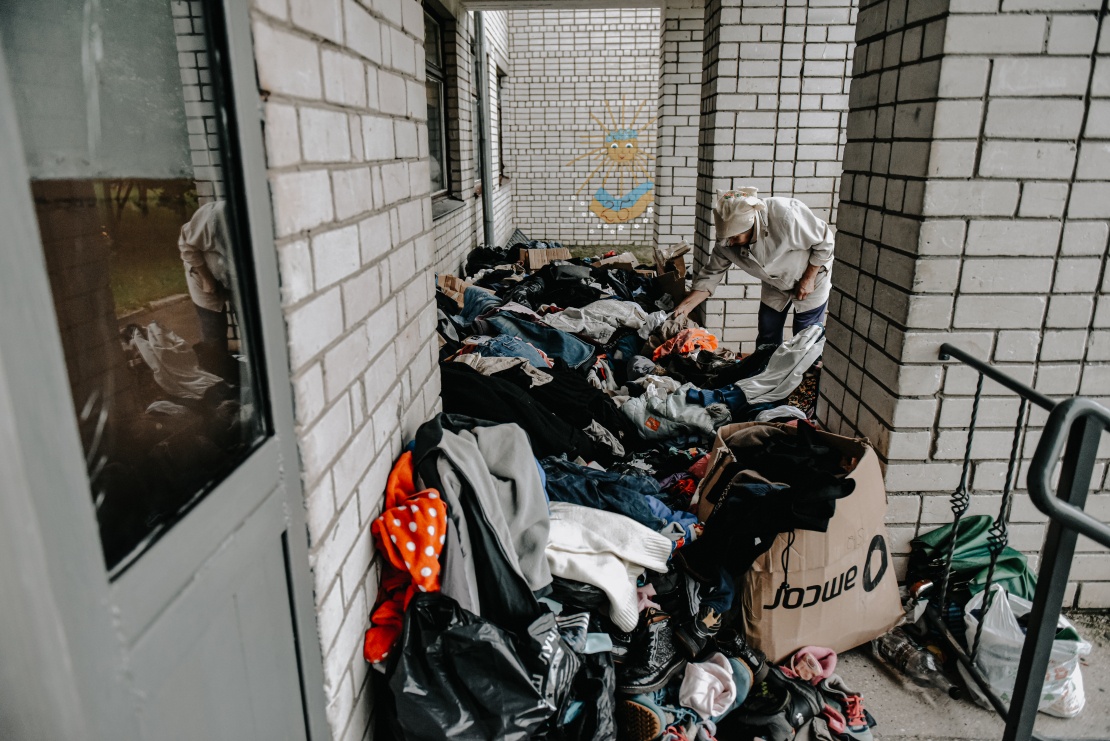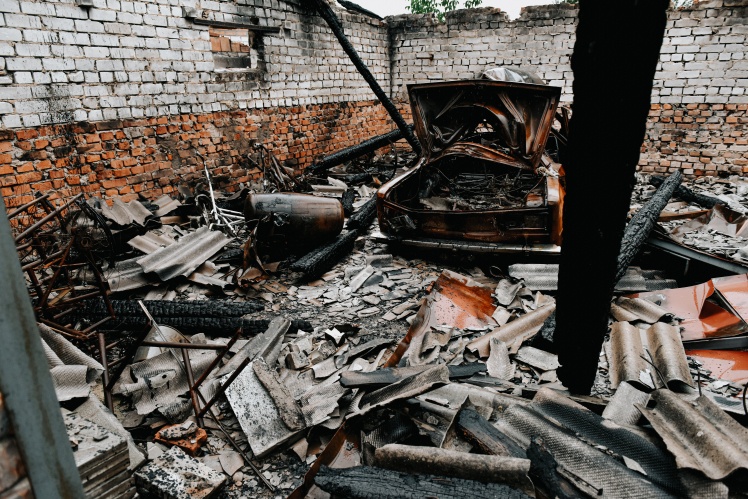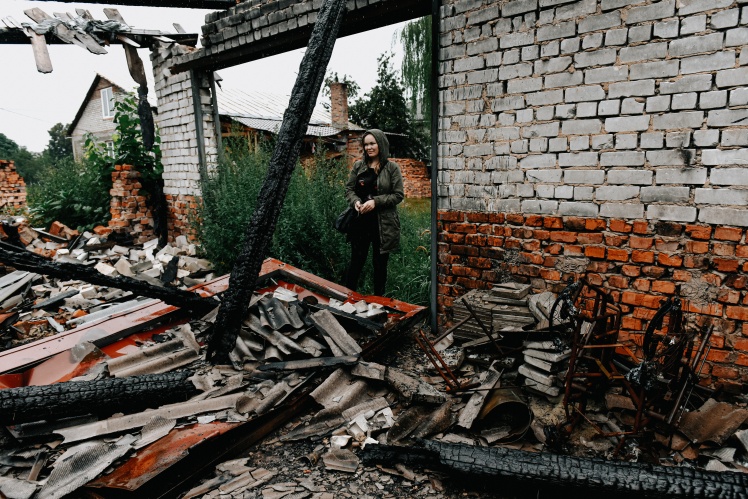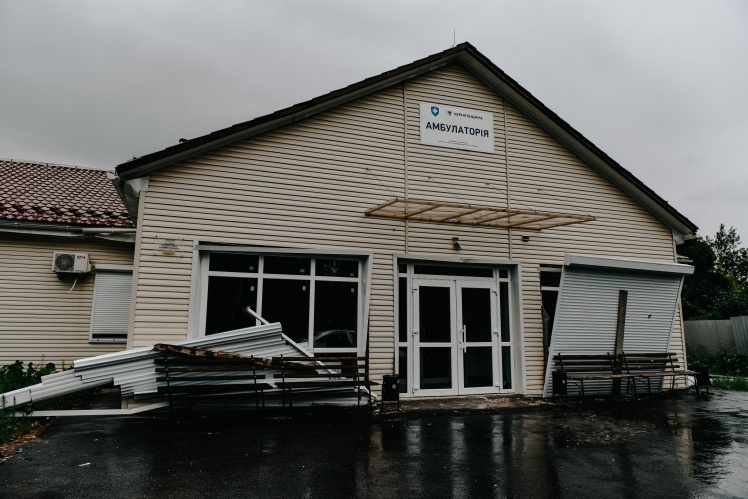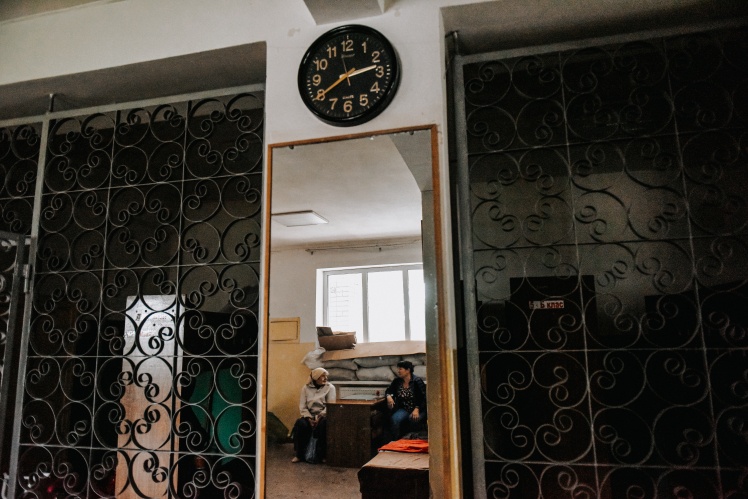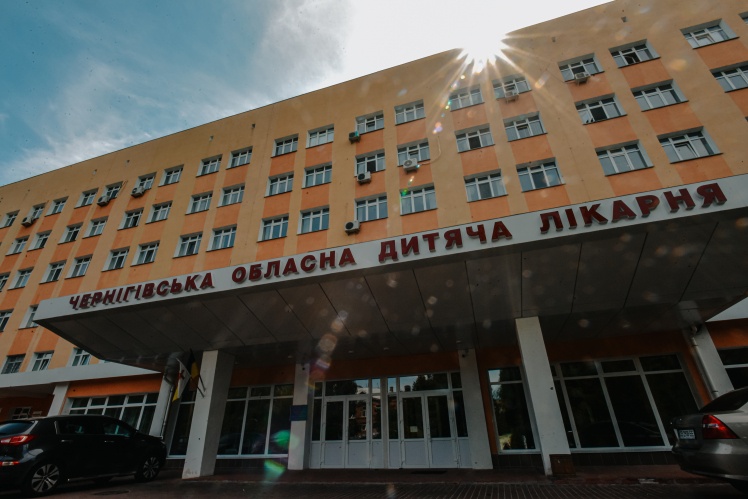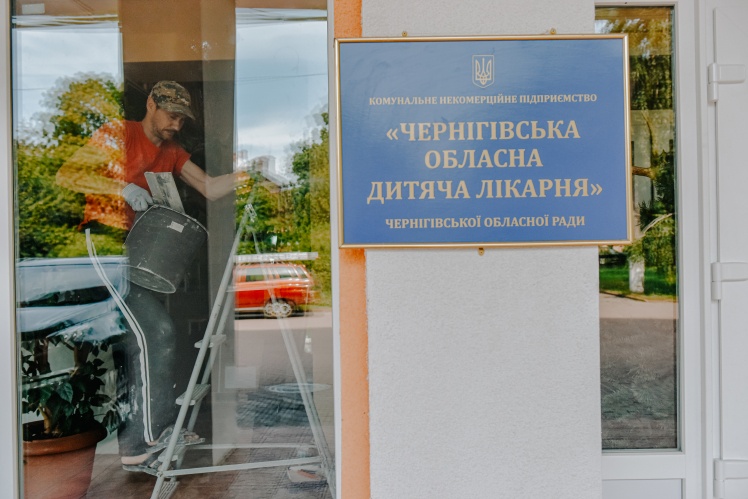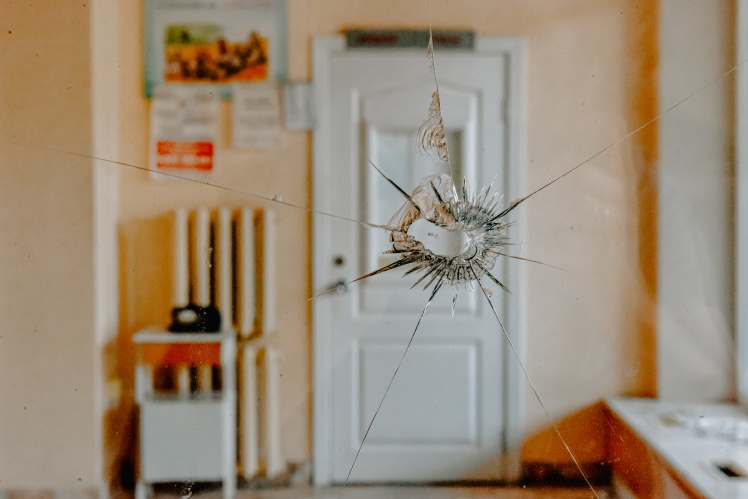In the yard of the school in Kyinka, there are still remains of fortifications with metal "hedgehogs" and barbed wire. Here and there, on the facade, there are traces of projectile fragments, some windows are broken. There is still a pile of clothes and shoes on the porch, which someone sorts through from time to time. In the dressing room there are boxes with grocery sets, under the honor board there are sandbags.
Oleg Petrasyuk / «Babel»
Nurse Svitlana Vorona is 36, but she seems very young because of her snub nose. Svitlana takes us to an empty teacherʼs office: the flag of Ukraine stands in the corner, diplomas hang on the walls. From time to time, people peek into the room: someone is looking for Svitlana, someone needs humanitarian aid, someone is just curious. Among the latter is a thin and tanned man in his 50s, with bald patches and a hooked nose.
― This is our local hero, ― Svitlana briefly introduces Anatoliy.
— Oh, why hero? ― he waves it off but is in no hurry to run away from compliments. — Everything has already been experienced, and everything has already passed. What kind of hero am I?
— But how much have you done! A low bow to you, — Svitlana continues.
Anatoliy is a municipal worker in the Kyinka village council. In March, when the Russians surrounded the village, he carried food in buckets to civilians and soldiers at a nearby position.
― He [Anatoliy] said: "If the boys go to Moscow to attack, I will follow them," — Svitlana says, and the man laughs, blushing. Suddenly, she adds. — On February 28, his son was killed...
— Ah! ― the man waves his hand sharply and leaves.
— His son served in the police, he got shot in a car, — says the nurse when the manʼs footsteps subside. She knows the local dead as well as the living.
Oleg Petrasyuk / «Babel»
The most terrible day
Svitlana has been working in Kyinka for 16 years. On February 23, she and her friend, a local deputy, planned what to do in the event of a full-scale Russian attack. They decided to stay in the village and cooperate but to take the children away.
On the morning of February 24, Svetlana received a call from a colleague: "The war has begun." The woman hid the documents in the cellar, took the money she had saved for the construction, and went to Chernihiv to get medicine — antibiotics, bandaging supplies, hemostatic drugs, blood pressure medicine. During three days of such trips, Svitlana bought almost 100,000 hryvnias worth of medicines.
— We were at work when the head of the village called and told us to hide because there was a threat of artillery fire, — Svitlana recalls on February 27, when the war reached Kyinka. ― The Russians were already encircling Chernihiv. And so they reached us and "greeted" like this — with full-cassette charges of Grad and Smerch.
Svitlana hid in the basement with her husband, son, and mother-in-law. When the shelling ended, the woman went outside and felt what she now calls "the smell of hell" — a pungent sulfur smell. The house stood — only the roof was damaged. There was no time to look around the yard: Svitlana and her husband immediately went to help the wounded.
Oleg Petrasyuk / «Babel»
— One was dead, the second had non-life-threatening injuries, the third had [a wound in] the stomach, the fourth was hit by fragments, the fifthʼs face was torn. Two more were in a stupor, they were not affected physically, — Svitlana briefly enumerates. ― The midwife came out, and we helped together when the Russians started shelling again. We hid under a wooden fence, and I only remember how my husband dragged us by the hoods into the house. He put us behind the wall and covered us with himself.
That day, many civilians and soldiers in the nearby positions died in the village.
— We collected bodies, — says Svitlana. ― My husband is afraid of blood in general, but he helped to pull out the dead soldiers at the positions. He put parts of the bodies into bags. The head of the village council found cars for people to take the bodies to the morgue. Then I wrote out death certificates myself — more than 30 in a month. Those who could, buried their close ones in the cemetery, some just in the yards.
Encircled
Among the dead on February 28 there was a medic from one of the army units, so the military asked Svitlana to replace him. She explained that she was a civilian, but she could not refuse. She sent her son to the neighboring village to her aunt and got to work.
— I will remember the feet of the soldiers on March 1 for the rest of my life, — she says. ― After a week in the damp evironment, without taking off socks, their legs were bruised and with bloody calluses. I collected pads, powders, starch, antiseptics, alcohol, socks, slippers from all my friends — we dried feet using them.
Oleg Petrasyuk / «Babel»
Svitlana was advised a fund that provided the military with hygiene products and medicine. When it was possible, the wounded were taken to the Chernihiv hospital. Together with a doctor from another army unit, Svitlana organized a room for the wounded and an operating room in the village school. Her husband dug trenches, carried sand and water. The village head went to the city to exchange medicine for bread and gasoline.
— The village fed the soldiers for more than a month, — says Svitlana.
— The problem was shrapnel wounds, they are insidious. The wound is small, but the liver has been punctured, so the person cannot be saved, — she continues. — The fragments are small, they bleed, nothing is visible, and there are no clamps for blood vessels. So we anesthetized, soaked, and sewed. Finding the shard was difficult. We didnʼt have an X-ray machine, so we had to thank our gas engineer — he brought a large magnet from home, and we brought it to the wound. If the wounded person is in pain, it means that the fragment is moving, and you just need to look for it.
Svitlana quickly became friends and associates with the military. They warned if there was a threat of a breakthrough, and Svetlana had two grenades with her just in case. She planned to throw one at the Russians, with the other to blow herself up so as not to be captured — she was afraid of rape and torture. She also made sure that the lists of military personnel from Kyinka did not fall into the hands of the Russians. The documents with their data were taken by Svitlanaʼs husband, and neither she nor the village head knew where they were hidden.
Nevertheless, the nurse talks about her role reluctantly: she mentions the midwife who helped, the former nurse who bought medicine according to her lists, the husband who drove her to appointments, the military who organized everything and made a trench for her for "appointments".
Oleg Petrasyuk / «Babel»
— I was just there, and everyone was engaged, — says Svitlana. — They also had a very large part of the work. I stayed because how could I pack up and go if Iʼm a medic? And those civilians who simply remained there are my heroes. Treatment, nutrition, adjusting the fire — everything was done. The soldiers, when leaving the village, said that they would have lasted a week without our help. They still come to us now when they have rotations — everyone who was here is already like a family.
A family
— It hurt me a lot that the military left, and I stayed, — says Svitlana, smiling sadly. — I wanted to join the Armed Forces, but I stayed because of my family.
Svitlana receives people in the schoolʼs medical office — a separate hospital trailer is not yet ready. Most often, they turn to her for sedatives and hypnotics.
— People still cannot recover from what they experienced, — says Svitlana. — When they attacked Honcharivske, those one and a half hours seemed to be longer than the whole of March. At first, you think that you are holding on, you consider yourself a stable person — and then you feel so weak, you canʼt do anything. We are morally exhausted. And many say that they will not survive this a second time.
In the building of the old dispensary, which was fired upon by the Russians, the windows have already been replaced. There is a note on the door that the reception is at the school. There are mountains of clothes and dishes from humanitarian aid on the tables. The red runner of the wall calendar froze on February 23.
Oleg Petrasyuk / «Babel»
― It is more difficult with civilians now, ― the woman seems to continue the interrupted conversation. ― Some donʼt have enough humanitarian aid, and some have not been given the same amount as others. In March, there were also those who said that we were being fired upon because the Ukrainian military was defending itself. And in April, they threatened that if the Russians came again, they would "surrender" me first.
However, such people are still a minority. Svitlana knows which of the neighbors died while covering the child, who dug the graves with their own hands, and who warmed her mother-in-law, who ran to feed the animals. Svetlana looks around the street and smiles with touching smile:
— Before the war, there were just neighbors, and after — they became relatives.
"You can get used to everything"
Until February 24, Mykola Lyutkevych was the head of the Department of Traumatology and Orthopedics of the Chernihiv Oblast Childrenʼs Hospital. Now he performs the duties of its director. Before Chernihiv, he worked in Kyiv and Kharkiv, specializing in children with cerebral palsy.
In February, his hospital had formal instructions on how to prepare for an invasion from the Ministry of Health, but no one particularly prepared — they did not set up shelters, did not make large-scale purchases, did not meticulously collect evacuation suitcases. Mykola says that it was like that everywhere. It was because of the unexpectedness that February 24 became terrifying for him.
From the first days, the hospital turned from a childrenʼs one into a universal hospital — children, adults, the elderly, and the military were accepted. In peacetime, about 400 medical personnel worked in the hospital, together with technical workers and female workers there were 600. Of them, there were only 40 people constantly during the siege — they evacuated, carried water and food, filled bags with sand, furnished the basement, repaired generators, took children to shelters during air raids, did laundry and cooked. And conducted operations, of course. In the early days, they lived on different floors, but very soon everyone moved to the basement and a large office on the first floor. The families of doctors and townspeople from the surrounding houses flocked to the basements of the hospital, taking their pets with them.
Oleg Petrasyuk / «Babel»
When the lights went out and the generators didnʼt work, nurses manually "breathed" for hours with an Ambu bag instead of children who couldnʼt breathe on their own. At night, meeting in the corridors, nurses and doctors cried on each otherʼs shoulders. Colleagues from "adult" hospitals sent photos and X-rays of injured children admitted to them. Sometimes it was possible to bring them — because those who know the childrenʼs body well will operate better. Sometimes doctors from the "childrenʼs" hospital went to operate under fire.
Once Mykola went to operate on a 9-year-old boy with a fracture of both hips, a pelvis, a chest and brain injuries. When the doctor reached him, the boy had already been operated on for three hours. The joint operation continued for another three hours without heating, proper lighting, all working devices, and time to sew up all the wounds. Mykola seems to be making an excuse, saying that they were standing there in sweaters, and for a child to spend so much time on the operating table in the cold is even more difficult. A few days later, the boy died in intensive care.
Operations in the "childrenʼs" hospital took place in the same conditions — warm clothes, a headlamp, and manual "breathing" of anesthesiologists for patients on the operating table. One 2-3 kilowatt generator could support only the ventilator and the operating lamp, and when an electro-knife or a coagulator was added, everything went out because of too much voltage.
— But we didnʼt have time to be afraid, — Mykola shrugs. — A person can get used to everything.
Oleg Petrasyuk / «Babel»
"Mass Inflow"
The day Mykola will remember forever is March 3.
— In 2013, I attended a course in the United States where we were taught how to triage victims of natural disasters and war, — he says as we leave the office and head for the stairs. — They laid out the material so beautifully that it bounced off my teeth. But I never thought I would use it. It was engraved in our hearts.
We stop at the window on the fourth floor. A broken high-rise building on Chornovil Street can be seen from behind the trees. Mykola recalls:
― It was one or two oʼclock in the afternoon, everyone was doing their own business. And they saw the plane from the fourth floor. One colleague says, "Oh, itʼs ours." And as soon as he said it — there was a horrible explosion. Six to eight bombs fell from that plane.
Then Mykola remembers everything minute by minute. Four minutes later, 37 wounded people arrived. Military personnel, families from their homes, adults and children from the line for bread in the yard. This is called "mass admission" — when you have to leave those who will no longer survive and help those who still have a chance. Because there will not be enough for everyone.
The porch could hold 30 stretchers. There, they cut off the bloody clothes and shoes to get to the wound. A corner for "200s" was set up near the elevator. The critically wounded were left there with the nurse, providing minimal assistance. Instead, they ran to children and adults who could survive. They changed clothes several times because they were covered in blood.
The soldiers were the first to be brought in — one of them died immediately in the corridor. They covered him with a sheet and ran further.
— Everyone was lost, — says Mykola. — No one has ever seen anything like this. Usually, there would be a surgeon, an anesthesiologist, and nurses next to each patient. And now we saw a young soldier with half his head missing, and no one thought he had a mother who would cry if he died. Because there are ten children nearby that we can save. And these children also say: "Will you save our mother?".
Oleg Petrasyuk / «Babel»
The main task for Mykola was to organize the process, not to treat. Nurses, who previously worked with newborns, put on drips and bandaged the soldiers. Due to the lack of special tools, severe pelvic fractures were covered with sheets. The people who lived in the basements were horrified by what they saw, but they carried the wounded. Senior doctors who were in military service competently took weapons and grenades from the soldiers. They operated in four rooms, the stabilized ones were sent to other hospitals, the children stayed there.
In the end, several mistakes were made: stretchers blocked the corridor, and these are precious minutes; all the tourniquets and bandages were in one office, not several along the corridor; the still-working X-ray machine was on the second floor, not the first. However, only one person died — the very first soldier with a head injury.
Everything lasted 20-30 minutes.
— And it seemed that a whole hour passed in a second. Our hearing, vision, and sense of smell became sharper — we could smell blood a few meters away as painters smell the paint. And now weʼre talking about it — and itʼs like it was a dream.
The flag
Mykolaʼs former office is on the fourth floor. Although some of the windows have not yet been replaced, the department is working. From "his floor" to the new office, Mykola took several missile fragments that had flown into the corridor — now they lie in his drawer in a small bag. On the table there is a diary where he wrote down his experiences. The phone contains photos of the wounded, which were taken almost by force in order to document the crime.
Oleg Petrasyuk / «Babel»
But the most striking reminder of the month of life and work under shelling is a blue-yellow flag on the wall.
— You know, all of us who stayed here seem to have been baptized by the war, — says Mykola. — You respect all your colleagues, but you want to hug them, like for the first time and for the last time. You look at this flag, and everything explodes inside — we were at such a limit!... But if not us, then who? We do not even guess how much a person can endure.
The flag hung in one of the operating rooms for a whole month, and on April 8, all those who survived March in the hospital gathered in Mykolaʼs new office, spread the flag on the table, and wrote something — signatures, names, thanks.
― This “Thank you, colleagues!” was written by an anesthesiologist who worked for us before and returned to help in March, ― Mykola recognizes the signatures. ― And these are volunteers from the USA, from France, who came later... My signature? I quietly wrote "Mykola Lyutkevych" and added the trident. This will be our flag even after the victory.
And among the signatures, acknowledgments, and dates there is one very short "Eternal glory to the UAF".
Oleg Petrasyuk / «Babel»
Translated from Ukrainian by Anton Semyzhenko.
You have no idea how much a medium can sustain when it has the support of an audience. Help Babel: Patreon 🔸 [email protected]🔸donate in cryptocurrency🔸in hryvnia.
